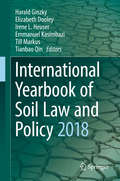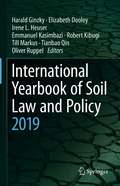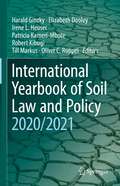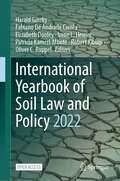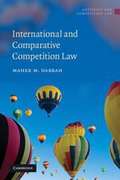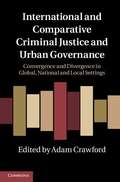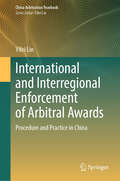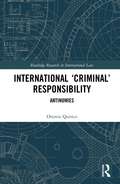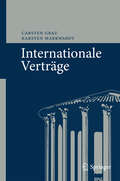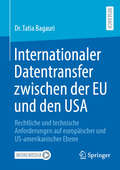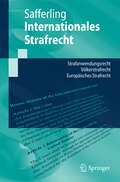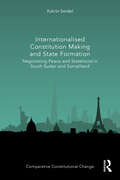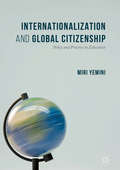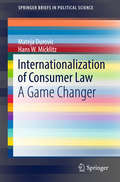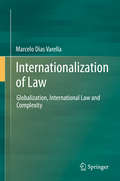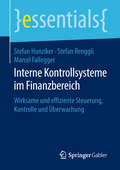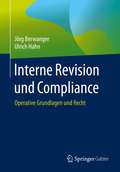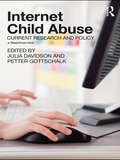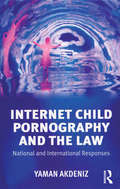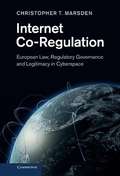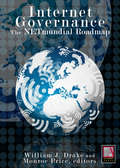- Table View
- List View
International Yearbook of Soil Law and Policy 2018 (International Yearbook of Soil Law and Policy #2018)
by Harald Ginzky Irene L. Heuser Tianbao Qin Elizabeth Dooley Emmanuel Kasimbazi Till MarkusThis book presents an important discussion on urbanization and sustainable soil management from a range of perspectives, addressing key topics such as sustainable cities, soil sealing, rehabilitation of contaminated soils, property rights and liability issues, as well as trading systems with regard to land take.This third volume of the International Yearbook of Soil Law and Policy is divided into four parts, the first of which explores several aspects of the topic “urbanization and sustainable management of soils.” The second part then covers recent international developments, while the third part presents regional and national reports, and the fourth discusses cross-cutting issues. Given the range of key topics covered, the book offers an indispensible tool for all academics, legislators and policymakers working in this field. The “International Yearbook of Soil Law and Policy” series discusses central questions in law and politics with regard to the protection and sustainable management of soil and land – at the international, national and regional level.
International Yearbook of Soil Law and Policy 2019 (International Yearbook of Soil Law and Policy #2019)
by Harald Ginzky Irene L. Heuser Tianbao Qin Elizabeth Dooley Emmanuel Kasimbazi Till Markus Robert Kibugi Oliver RuppelThis book presents an important discussion on the implementation of sustainable soil management in Africa from a range of governance perspectives. It addresses aspects such as the general challenges in Africa with regard to soil management; the structural deficiencies in legal, organizational and institutional terms; and specific policies at the national level, including land cover policies and persistent organic pollutants.This fourth volume of the International Yearbook of Soil Law and Policy is divided into four parts, the first of which deals with several aspects of the theme “sustainable soil management in Africa.” In turn, the second part covers recent international developments, the third part presents regional and national reports (i.a. Mexico, USA and Germany), and the fourth discusses cross-cutting issues(i.a. on rural-urban interfaces). Given the range of key topics covered, the book offers an indispensible tool for all academics, legislators and policymakers working in this field.The “International Yearbook of Soil Law and Policy” is a book series that discusses central questions in law and politics with regard to the protection and sustainable management of soil and land – at the international, national and regional level.
International Yearbook of Soil Law and Policy 2020/2021 (International Yearbook of Soil Law and Policy #2020)
by Harald Ginzky Irene L. Heuser Oliver C. Ruppel Elizabeth Dooley Till Markus Robert Kibugi Patricia Kameri-MboteThis book presents an important discussion on land tenure rights for the effective implementation of sustainable soil management provisions. It investigates a variety of aspects, such as the clash of modern and traditional tenure concepts, forms of illegal or illegitimate land acquisition, and the preconditions for legal and legitimate investments. In addition, the book analyses the challenges to ensuring secure land tenure rights in Africa and in Germany. Lastly, it provides information on the role of women in this context.This fifth volume of the International Yearbook of Soil Law and Policy is divided into four parts, the first of which deals with various aspects of the theme “Land Tenure Rights and Sustainable Soil Management”. The second part covers recent international developments, the third part presents regional and national reports, and the fourth discusses overarching issues. Given the range of key topics covered, the book offers an indispensable tool for all academics, legislators and policymakers working in this field.The “International Yearbook of Soil Law and Policy” series discusses central questions in law and politics with regard to the protection and sustainable management of soil and land – at the international, national, and regional level.
International Yearbook of Soil Law and Policy 2022 (International Yearbook of Soil Law and Policy #2022)
by Harald Ginzky Irene L. Heuser Oliver C. Ruppel Elizabeth Dooley Robert Kibugi Patricia Kameri-Mbote Fabiano De Andrade CorrêaThis open access book presents an important discussion on the interface between sustainable soil management and climate mitigation and adaptation. It investigates a variety of aspects in this context, such as the political and societal consequences for countries in the Global South, an assessment of the outcomes of the UNFCCC Conference of Parties held in Glasgow, appropriate legal instruments to promote desealing, regulatory concepts for negative emissions in soil and land use, the debate in Europe on carbon uptake in soils and the climate-related policy of the Convention on Biological Diversity. Lastly, it provides information on recent court rulings on climate mitigation in Germany and Australia and their relevance for sustainable soil management.This sixth volume of the International Yearbook of Soil Law and Policy is divided into four parts, the first of which deals with various aspects of the theme “Climate Mitigation and Adaptation and Sustainable Soil Management.”The second part covers recent international developments, the third presents regional and national reports, and the fourth discusses overarching issues. Given the range of key topics covered, the book offers an indispensable tool for all academics, legislators and policymakers working in this field. The “International Yearbook of Soil Law and Policy” series discusses central questions in law and politics with regard to the protection and sustainable management of soil and land – at the international, national, and regional level.
International and Comparative Competition Law
by Maher M. DabbahThis thorough appraisal of competition law and policy from an international and comparative perspective covers the role of different international organisations active in the area, the significance of multinational enterprises and, in particular, the differences between US and EU systems. Taking examples from regions such as Africa, the Middle East and Asia, Maher M. Dabbah looks at the law and policy in developing countries and at a regional level, the internationalisation of competition law and the doctrines of extraterritoriality, bilateral cooperation and multilateral cooperation as well as the relationship between competition and trade policy. The book should prove useful to anyone who is interested in gaining an insight into the international dimension of competition law and policy. It is written in a language and style which make such a complex topic both possible to understand and enjoyable.
International and Comparative Criminal Justice and Urban Governance
by Adam CrawfordCriminal justice has traditionally been associated with the nation state, its legitimacy and its authority. The growing internationalisation of crime control raises crucial and complex questions about the future shape of justice and urban governance as these are experienced at local, national and international realms. The emergence of new international justice institutions such as the International Criminal Court, the greater movement of people and goods across national borders and the transfer of criminal justice policies between different jurisdictions all present novel challenges to criminal justice systems as well as our understandings of criminal justice. This volume of essays explores the implications and impact of criminal justice developments in an increasingly globalised world. It offers cutting-edge conceptual contributions from leading international commentators organised around the themes of international criminal justice institutions and practices; comparative penal policies; and international and comparative urban governance and crime control.
International and Interregional Enforcement of Arbitral Awards: Procedure and Practice in China (China Arbitration Yearbook)
by Yifei LinThis book is the first to systematically illustrate the application of the New York Convention in China in English, integrating theory with practical cases. It covers a wide range of legal doctrines, judicial cases, and theoretical advancements since China became a member of the New York Convention in 1987. This book includes cases, materials, and commentaries concerning the recognition and enforcement of foreign arbitral awards in China throughout the previous 30 years. The book also addresses the mutual recognition and enforcement of arbitral awards between China mainland and Hong Kong, China mainland and Macao, China mainland and Taiwan Region. This book is organized into 6 chapters, providing a thorough research of the fundamental issues related to the enforcement of arbitral awards in China, while also offering guidance on the formalities and processes for applying to the court. This book aims mainly to enable the readers to know objectively and comprehensively how the New York Convention has been applied in China in recent years, and to provide useful information to international practitioners and academics regarding the enforcement of international and interregional arbitral awards in China. This book will serve as a valuable resource for such as lawyers and arbitrators, as it offers concise guidelines to effectively and successfully navigate arbitration proceedings. Alongside this, academics will find this book to be an excellent source of analysis in the field.
International ‘Criminal’ Responsibility: Antinomies (Routledge Research in International Law)
by Ottavio QuiricoIn the course of the 20th and 21st centuries, major offences committed by individuals have been subject to progressive systematisation in the framework of international criminal law. Proposals developed within the context of the League of Nations coordinated individual liability and State responsibility. By contrast, international law as codified after World War II in the framework of the United Nations embodies a neat divide between individual criminal liability and State aggravated responsibility. However, conduct of State organs and agents generates dual liability. Through a critical analysis of key international rules, the book assesses whether the divisive approach to individual and State responsibility is normatively consistent. Contemporary situations, such as the humanitarian crises in Syria and Libya, 9/11 and the Iraq wars demonstrate that the matter still gives rise to controversy: a set of systemic problems emerge. The research focuses on the substantive elements of major offences, notably agression, genocide, core war crimes, core crimes against humanity and terrorism, as well as relevant procedural implications. The book is a useful resource for practitioners, policymakers, academics, students, researchers and anyone interested in international law and politics.
Internationale Verträge
by Carsten Grau Karsten MarkwardtDas vorliegende Buch liefert in neun übersichtlichen Kapiteln einen kompakten Einstieg in den Bereich "Internationale Verträge" für jeden damit beschäftigten Praktiker. Es beantwortet die wichtigsten Fragen und schärft das Problembewusstsein für die Abfassung und Prüfung künftiger Verträge. Es beinhaltet neben zahlreichen Fallbeispielen, die vorwiegend der ober- und höchstgerichtlichen Rechtsprechung entnommen sind, Vorschläge zur Vertragsgestaltung, Vertragsdurchführung, Konfliktbewältigung, Durchsetzung von Ansprüchen im Ausland sowie Checklisten - von Praktikern für Praktiker.
Internationaler Datentransfer zwischen der EU und den USA: Rechtliche und technische Anforderungen auf europäischer und US-amerikanischer Ebene
by Dr. Tatia BagauriWeltweit sind Europa und Amerika die führenden Akteure und die wichtigsten Partner füreinander. Daher sind der internationale Datentransfer für Strafverfahren sowie wirtschaftliche Aktivitäten zwischen diesen Ländern ein sehr wichtiges und aktuelles Thema. Diese sind allerdings mit vielen rechtlichen Hindernissen sowie technischen Schwierigkeiten verbunden, die betrachtet, analysiert und angepasst werden müssen. Präventive rechtliche sowie normative Maßnahmen spielen dabei eine entscheidende Rolle. Trotz aller Bemühungen kann der Datentransfer beeinträchtigt werden: Daten können verloren gehen, Informationen können manipuliert werden, Systeme können angegriffen werden. Geschieht dies, sollen nachgelagerte Maßnahmen durchgeführt werden, damit die geplante digitale Datenübertragung reibungslos funktioniert. Dadurch wird der Schutz jedes Einzelnen gewährleistet. Menschen gehören Daten, und wenn Daten nicht geschützt werden, sind Menschen nicht geschützt. Sind Persönlichkeitsrechte geschützt, sind Menschenrechte geschützt – ein Wert, bei dem nichts und niemand Vorrang hat. Menschen und ihre Rechte werden immer höher eingestuft als jegliche Organisation oder Regierung auf der Welt. Aus diesem Grund ist das gesamte Thema unter besonderer Berücksichtigung der Persönlichkeitsrechte zu betrachten.
Internationales Strafrecht
by Christoph SafferlingDer Band bietet eine systematische Einführung in das Strafanwendungsrecht, das Europäische Strafrecht nach dem Lissabon-Vertrag sowie das Völkerstrafrecht auf der Grundlage des Internationalen Strafgerichtshofs. Zahlreiche Beispielfälle dienen der Erläuterung und der Vertiefung des Lernstoffs. Übersichten und Prüfungsschemata helfen, den Überblick zu behalten. Ein besonderes Augenmerk liegt auf der Darstellung den historischen und kriminalpolitischen Rahmenbedingungen sowie auf der methodischen Herleitung.
Internationalised Constitution Making and State Formation: Negotiating Peace and Statehood in South Sudan and Somaliland (Comparative Constitutional Change)
by Katrin SeidelThis book presents an in-depth and nuanced interdisciplinary and comparative analysis of (post-)conflict constitution-making in South Sudan and Somaliland, exploring the ways in which the two emerging states negotiate statehood in a globalised world. It critically examines the transfer of international constitution-making models as part of international rule of law promotion frameworks. Specific emphasis is placed on the socio-cultural translation dynamics of these models in conflict settings. The comparative study explores the tensions between state sovereignty and international interventions, examining whether international constitution-making involvement fosters the production of societal consensus or inadvertently impedes efforts to achieve stability and peace. By focusing on constitutional law-making, the book sheds light on how normative ideas are transformed in negotiations and opens up new analytical avenues for re-thinking conventional constitution-making practices. It critically reconsiders the assumption that every emerging state requires a written constitution, alongside the state-centred notion of sovereignty underpinning this paradigm. Additionally, the study addresses the power and knowledge hierarchies inherent in international interventions, providing empirical data from post-conflict African contexts. The book will be of interest to academics, researchers, and policy-makers working in the areas of comparative public law, constitutionalism, sociology of law, anthropology, legal geography, international relations, political science, and African studies.
Internationalization and Global Citizenship
by Miri YeminiThis book examines the integration of the international, global, and intercultural dimensions in contemporary education systems. Yemini provides a comprehensive understanding of the process of internationalization from different angles including policy-making, curriculum implementation, media discourse, and individual agency. The book illuminates and analyzes a set of key tensions of internationalization across multiple levels of schooling and across the domains of popular discourse, policy, curriculum, pedagogy, and students' identity, by connecting or re-connecting the process of internationalization and its outcomes at individual level of global citizenship. The author uses solid empirical embedding of each of those aspects together with development of novel theoretical insights in each of the investigated domains.
Internationalization of Consumer Law
by Hans W. Micklitz Mateja DurovicThis book examines the institutions that are producing consumer law at the international level, the substantive issues enshrined in these laws, and the enforcement mechanisms meant to ensure effective protection. The majority of existing research is devoted to the comparative perspective, between countries or between the US and the EU. This book investigates the forceful activities of international and regional organizations, and shifts the focus of research to the internationalization of consumer law, which is largely neglected in particular in the Western-centered political and legal debate. Much of what constitutes consumer law today is focused on banking and finance, and more broadly the financialization and digitalization of the global economy, and society has created a shift in international consumer law production. This book investigates the role that international organizations have on the creation and enforcement of consumer law, and will be of interest to consumer lawyers, practitioners, and officials in organizations such as the United Nations, European Union, and World Bank.
Internationalization of Law
by Marcelo Dias VarellaThe book provides an overview of how international law is today constructed through diverse macro and microprocesses that expand its traditional subjects and sources, with the attribution of sovereign capacity and power to the international plane (moving the international toward the national). Simultaneously, national laws approximate laws of other nations (moving among nations or moving the national toward the international) and new sources of legal norms emerge, independent of states and international organisations. This expansion occurs in many subject areas, with specific structures: commercial, environmental, human rights, humanitarian, financial, criminal and labor law contribute to the formation of post national law with different modes of functioning, different actors and different sources of law that should be understood as a new complexity of law.
Interne Kontrollsysteme im Finanzbereich: Wirksame und effiziente Steuerung, Kontrolle und Überwachung (essentials)
by Stefan Hunziker Stefan Renggli Marcel FalleggerDie Autoren zeigen in diesem essential auf, wie ein internes Kontrollsystem (IKS) insbesondere in kleinen und mittelgroßen Unternehmen einen wichtigen Beitrag zur finanziellen Führung leisten kann. Zahlreiche konkrete Beispiele und Lösungsansätze aus der Praxis erläutern, wie sich ein IKS pragmatisch und nutzenstiftend umsetzen lässt. Im Finanzbereich ist es ein unverzichtbares Element guter Unternehmensführung – unabhängig von der gesetzlichen Situation. Ein angemessen ausgestaltetes IKS stellt ein effektives Steuerungssystem dar, das eine effiziente operative Planung und Führung des Finanzbereichs unterstützt. Es leistet u. a. einen wichtigen Beitrag zur Steuerung und Kontrolle der Liquidität, zur Effizienzsteigerung finanzieller Prozesse und letztlich zu einem nachhaltigen Unternehmenswachstum.
Interne Revision und Compliance: Operative Grundlagen und Recht
by Jörg Berwanger Ulrich HahnDas Buch zeigt die Grundlagen der Internen Revision, mit Blick auf die Compliance. Der Rechtsteil behandelt wesentliche Rechtsfragen beider Unternehmensfunktionen. Der operative Teil orientiert sich an den typischen Revisionsaufgaben und Revisionsprozessen im privatwirtschaftlichen und im öffentlichen Kontext – mit Spiegelung zu den Aufgaben der Compliance. Der Fokus liegt auf einer pragmatisch-praxistauglichen Darstellung, Erläuterung und Umsetzung der Berufsgrundlagen und Best Practices der Internen Revision.Das Werk bietet eine fundierte Übersicht über die Grundlagen und die Ursprünge der Compliance- und Revisionsarbeit – und geht dabei auf erfrischende Weise über den sonst üblichen rein rechtlichen Rahmen hinaus. Der Bezug auf aktuelle Themen, verbunden mit einer direkten und offenen Auseinandersetzung mit Fehlern und Schwachstellen im System der Unternehmenscompliance, machen das Buch zu einer sehr lesenswerten Lektüre.Jörg Nierhaus, LL.M., Chief Compliance Officer, Essen
Internet Book Piracy: The Fight to Protect Authors, Publishers, and Our Culture
by Gini Graham ScottThe international battle against Internet pirates has been heating up. Increasingly law enforcement is paying attention to book piracy as ebook publishing gains an ever-larger market share. With this threat to their health and even survival, publishers and authors must act much like the music, film, and software giants that have waged war against pirates for the past two decades. Now, The Battle against Internet Piracy opens a discussion on what happens to the victims of piracy. Drawing from a large number of interviews-from writers, self-publishers, mainstream publishers, researchers, students, admitted pirates, free speech advocates, attorneys, and local and international law enforcement officials-the text speaks to such issues as: Why pirates have acted and how they feel about it The conflict over constitutional rights and piracy The current laws surrounding Internet piracy Examples of cases taken against some pirates Alternatives to piracy Personal experiences of being ripped off The ways piracy affects different industries and how they’ve respondedAuthor Gini Graham Scott prepares readers to arm themselves against these modern perils by learning about copyright, infringement, and how to prevent, combat, and end book piracy.Allworth Press, an imprint of Skyhorse Publishing, publishes a broad range of books on the visual and performing arts, with emphasis on the business of art. Our titles cover subjects such as graphic design, theater, branding, fine art, photography, interior design, writing, acting, film, how to start careers, business and legal forms, business practices, and more. While we don't aspire to publish a New York Times bestseller or a national bestseller, we are deeply committed to quality books that help creative professionals succeed and thrive. We often publish in areas overlooked by other publishers and welcome the author whose expertise can help our audience of readers.
Internet Branding For Lawyers: Building The Client-centered Website
by Jeff LantzCovering methods applicable to firms serving individuals as well as firms serving businesses, this reader-friendly guide shows how to create a brand and a website for a law firm. Lantz, a consultant in brand creation and website development who holds an MBA in finance, advises readers to focus on the customer perspective: how will you help me and how much will it cost. The book begins by explaining the increased importance of branding in today's information age, then explains how to build a brand around the law firm's practices and how to communicate the brand through website content and design. The final section of the book is given over to technical details and decisions related to areas such as content management systems, choosing a website developer, search optimization, domain names, and servers and website hosting. The book includes many bullets and checklists, along with b&w photos, screenshots, and examples of logos. Annotation ©2012 Book News, Inc. , Portland, OR (booknews. com)
Internet Child Abuse: Current Research and Policy
by Julia DavidsonInternet Child Abuse: Current Research and Policy provides a timely overview of international policy, legislation and offender management and treatment practice in the area of Internet child abuse. Internet use has grown considerably over the last five years, and information technology now forms a core part of the formal education system in many countries. There is however, increasing evidence that the Internet is used by some adults to access children and young people in order to ‘groom’ them for the purposes of sexual abuse; as well as to produce and distribute indecent illegal images of children. This book presents and assesses the most recent and current research on internet child abuse, addressing: its nature, the behaviour and treatment of its perpetrators, international policy, legislation and protection, and policing. It will be required reading for an international audience of academics, researchers, policy-makers and criminal justice practitioners with interests in this area.
Internet Child Pornography and the Law: National and International Responses
by Yaman AkdenizThis book provides a critical assessment of the problem of internet child pornography and its governance through legal and non-legal means, including a comparative assessment of laws in England and Wales, the United States of America and Canada in recognition that governments have a compelling interest to protect children from sexual abuse and exploitation. The internet raises novel and complex challenges to existing regulatory regimes. Efforts towards legal harmonization at the European Union, Council of Europe, and United Nations level are examined in this context and the utility of additional and alternative methods of regulation explored. This book argues that effective implementation, enforcement and harmonization of laws could substantially help to reduce the availability and dissemination of child pornography on the internet. At the same time, panic-led policies must be avoided if the wider problems of child sexual abuse and commercial sexual exploitation are to be meaningfully addressed.
Internet Co-Regulation
by Christopher T. MarsdenChris Marsden argues that co-regulation is the defining feature of the Internet in Europe. Co-regulation offers the state a route back into questions of legitimacy, governance and human rights, thereby opening up more interesting conversations than a static no-regulation versus state regulation binary choice. The basis for the argument is empirical investigation, based on a multi-year, European Commission-funded study and is further reinforced by the direction of travel in European and English law and policy, including the Digital Economy Act 2010. He places Internet regulation within the regulatory mainstream, as an advanced technocratic form of self- and co-regulation which requires governance reform to address a growing constitutional legitimacy gap. The literature review, case studies and analysis shed a welcome light on policymaking at the centre of Internet regulation in Brussels, London and Washington, revealing the extent to which states, firms and, increasingly, citizens are developing a new type of regulatory bargain.
Internet Economics
by Lee W. Mcknight Joseph P. BaileyThe Internet has rapidly become an important element of the economic system. The lack of accepted metrics for economic analysis of Internet transactions is therefore increasingly problematic. This book, one of the first to bring together research on Internet engineering and economics, attempts to establish such metrics. The chapters, which developed out of a 1995 workshop held at MIT, include architectural models and analyses of Internet usage, as well as alternative pricing policies. The book is organized into six sections: 1) Introduction to Internet Economics, 2) The Economics of the Internet, 3) Interconnection and Multicast Economics, 4) Usage Sensitive Pricing, 5) Internet Commerce, and 6) Internet Economics and Policy. Contributors: Loretta Anania, Joseph P. Bailey, Nevil Brownlee, David Carver, David Clark, David W. Crawford, Ketil Danielsen, Deborah Estrin, Branko Gerovac, David Gingold, Jiong Gong, Alok Gupta, Shai Herzog, Clark Johnson, Martyne M. Hallgren, Frank P. Kelly, Charlie Lai, Alan K. McAdams, Jeffrey K. MacKie-Mason, Lee W. McKnight, Gennady Medvinsky, Liam Murphy, John Murphy, B. Clifford Neuman, Jon M. Peha, Joseph Reagle, Mitrabarun Sarkar, Scott Shenker, Marvin A. Sirbu, Richard Jay Solomon, Padmanabhan Srinagesh, Dale O. Stahl, Hal R. Varian, Qiong Wang, Martin Weiss, Andrew B. Whinston.
Internet Fraud Casebook
by Wells Joseph T.Real case studies on Internet fraud written by real fraud examiners Internet Fraud Casebook: The World Wide Web of Deceit is a one-of-a-kind collection of actual cases written by the fraud examiners who investigated them. These stories were hand-selected from hundreds of submissions and together form a comprehensive, enlightening and entertaining picture of the many types of Internet fraud in varied industries throughout the world. Each case outlines how the fraud was engineered, how it was investigated, and how perpetrators were brought to justice Topics included are phishing, on-line auction fraud, security breaches, counterfeiting, and others Other titles by Wells: Fraud Casebook, Principles of Fraud Examination, and Computer Fraud Casebook This book reveals the dangers of Internet fraud and the measures that can be taken to prevent it from happening in the first place.
Internet Governance: The NETmundial Roadmap
by Monroe E. Price Patrick Ryan Larry Gross Arlene Luck Joana Varon Ferraz Matthew Shears Ronaldo Lemos Vint Cerf Emma Llansó William J. Drake Max Senges Shawn Powers Jeremy Malcolm Lea Kaspar Nnenna Nwakanma Anriette Esterhuysen Avri Doria Samantha Dickinson Wolfgang Kleinwächter Richard Whitt Markus Kummer James Losey Marilia Maciel"Following up on the promise of the NETMundial meeting, this timely and useful book explores the challenges of implementing its roadmap for the future of Internet governance." -- Milton L. Mueller, Professor, Syracuse University School of Information Studies, USAInternet Governance: The NETmundial Roadmap explores key implications of the Global Meeting on the Future of Internet Governance held on April 23-24, 2014 in São Paulo, Brazil. At the meeting, government, business, civil society, Internet technical community and academic participants from around the world agreed to a "NETmundial Multistakeholder Statement" that included a "Roadmap for the Future Evolution of Internet Governance." This volume brings together leading practitioners and scholars to explore the challenges of implementing the Roadmap's section on institutional improvements, and was prepared for release and debate at September 2014 global Internet Governance Forum in Istanbul. The 16 chapters are grouped into six sections: Overviews; Strengthening the Internet Governance Forum; Filling the Gaps; Improving ICANN; Broader Analytical Perspectives; and Moving Forward. The book was produced as a part of the Internet Policy Observatory, a program at the Center for Global Communication Studies, the Annenberg School for Communication at the University of Pennsylvania. It is edited by William J. Drake of the University of Zurich and Monroe Price of the Annenberg School for Communication.
